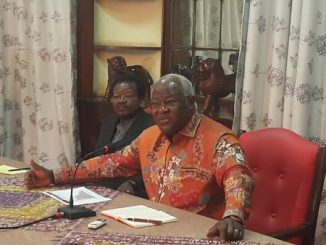
*WILL THE WORLD DEFEND THE RIGHT TO TRUTH*
*by Mahmud Tim Kargbo*
*Saturday, August 2024*
With the swift proliferation of online falsehoods, many contend that truth has become irreversibly divided. However, governments possess the power to alter this trajectory by ensuring that news organisations, digital platforms, and political figures deliver the most accurate information available, while also formally acknowledging the right to be free from deception by those in power.
In recent times, it seems there’s hardly a week that passes without new misinformation surfacing online, ranging from the wave of conspiracy theories sparked by the assassination attempt on former US President Donald Trump to Elon Musk’s tweets promoting what some consider to be false assertions regarding a two-tier policing system in the UK. The truth faces significant challenges, and the public is increasingly aware. A recent global survey by the United Nations revealed that over 85% of participants expressed concern about the ramifications of online misinformation.
The world is inundated with falsehoods and misrepresentation, largely due to the rise of social media and digital platforms. Created to thrive by maximising user engagement, the algorithms of these platforms prioritise content that grabs attention, irrespective of its truthfulness. Additionally, studies indicate that negative content tends to enhance engagement, with one study noting that each extra negative word in a headline boosted the click-through rate by 2.3%.
Another contributing factor to our struggle against misinformation is that liberal traditions have placed a higher value on freedom of expression than on the right to truth. The prevailing argument suggests that any limitations on free speech in democratic societies would be exploited by authoritarian regimes to justify censorship and worse actions.
The Western perspective on free speech operates under the assumption that a fair and open competition in the “marketplace of ideas” will ensure that truth prevails over falsehoods. However, it has become evident that this assumption is flawed. A principle akin to Gresham’s Law, which states that bad currency drives good currency out of circulation, can be applied to information: the notion of “flooding the zone with falsehoods,” as articulated by Trump’s former chief strategist, Steve Bannon, breeds distrust and complicates the task of distinguishing fact from fiction.
Some assert that truth is irretrievably fragmented. Nevertheless, several nations have bolstered institutions designed to uncover the most accurate truths, which are often vital to societal and economic stability. Financial regulations penalise deception and falsehood in financial reporting. Courts utilise advanced forensic methods, such as DNA analysis, to enhance their decision-making processes. Furthermore, contemporary science mobilises critical peer review to scrutinise claims.
To advance these efforts, we must build upon existing frameworks to ensure that every influential institution delivers the most accurate information possible. At the core of this initiative would be the establishment of a new right to truth, grounded in well-established ethical principles such as the golden rule and the categorical imperative. This concept, prevalent across diverse cultures, emphasises treating others as one wishes to be treated, providing a solid basis for reconstructing the framework of truth.
The initial focus should be on legal reform. Many governments worldwide have robust consumer protection laws that prohibit misleading and false advertising. This principle should extend to all political communications—a move currently under consideration in Australia, alongside various measures aimed at enhancing democratic resilience—and eventually to all forms of mass communication. Deliberately disseminating falsehoods should carry repercussions, primarily financial, but potentially including disqualification from public office or media roles.
The legal system has occasionally intervened to hold media organisations accountable for spreading misinformation. For instance, Dominion Voting Systems’ defamation lawsuit against Fox News, regarding claims that its voting machines manipulated the 2020 US presidential election against Trump, resulted in a settlement of nearly $800 million. However, much more can be done to create pathways for legal action against blatantly dishonest media outlets and political figures through new legislation targeting the intentional spread of falsehoods.
Furthermore, independent institutions committed to truth must be reinforced. Such institutions already exist in the realms of science, finance, health, and safety. In the media landscape, nonprofit news organisations and public broadcasting serve this purpose. The effectiveness of these institutions hinges on their independence from political and market influences.
Additionally, regulatory measures could compel influential information providers to become reliable sources of truth. In July, the European Commission revealed its initial finding that Musk’s X misleads users by allowing anyone to purchase verified accounts, thereby violating the Digital Services Act. Consequently, X could incur fines of up to 6% of its global revenue. In parallel, Germany’s Network Enforcement Act, enacted in 2017, mandates platforms with over two million users to eliminate “clearly illegal” content.
Moreover, independent electoral commissions should be granted authority to fact-check and rectify false statements and to block the dissemination of the most harmful misinformation or deepfakes, especially during election periods when truth is most susceptible and the potential for interference is highest.
Education must also evolve to better prepare future generations to discern truth from falsehoods. Schools should equip students with the skills to recognise various forms of misinformation. Countries like Finland and Denmark are pioneering this initiative by integrating lessons on disinformation into their curricula.
Finally, innovative tech solutions are emerging, with organisations like Factiverse, Fullfact in the UK, Myth Detector in Georgia, and Norway’s Faktisk Verifiserbar developing new tools that combine artificial and collective intelligence to identify and evaluate misinformation. These and similar initiatives warrant encouragement and support.
To ensure the effective implementation of these measures, the right to truth—essentially, the right not to be deceived or misled by powerful entities—should be incorporated as a protocol in the European Convention on Human Rights, the Economic Commission for Latin America and the Caribbean, the ASEAN Intergovernmental Commission on Human Rights, and the African Charter on Human and Peoples’ Rights, while balancing the US Constitution’s free speech protections. A high standard should be established for invoking this right to consider differing opinions and interpretations, and enforcement should be the responsibility of the judiciary, not governmental bodies or “Ministries of Truth.”
All other civil liberties inherently depend on a right to truth. For instance, the right to a fair trial by jury holds little significance unless judges guarantee that juries receive the most accurate information available. More broadly, truth relies on an ongoing process of discovery supported by laws and institutions.
It seems that Musk and others firmly believe in the absolute value of free speech, positing that the right to lie should take precedence over the right to truth. Their perspective is understandable and rooted in noble principles. However, it has increasingly become perilous and ill-suited for contemporary challenges.
The seventeenth-century French mathematician Blaise Pascal remarked, “Truth is so obscure in these times, and falsehood so established, that unless we love the truth, we cannot know it.” Today, we must demonstrate that love by enshrining it as a right and placing it at the core of our legal frameworks and constitutions.




Leave a Reply